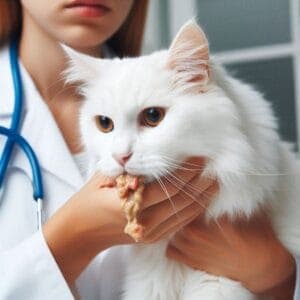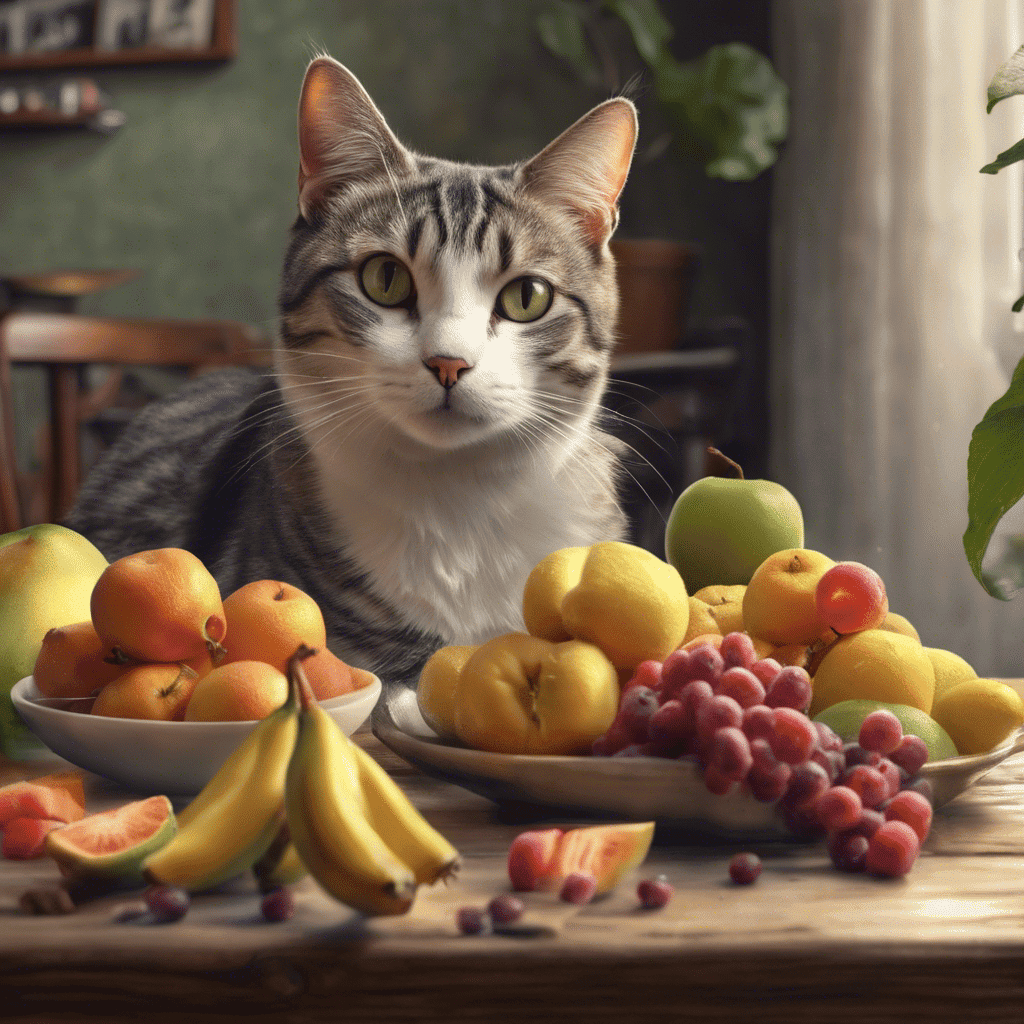
Have you ever wondered why your cat sometimes throws up their food? It’s a common issue many cat owners face, and it often sparks a mix of concern and curiosity. This article aims to unravel the reasons behind this distressing behavior. We’ll explore various causes, from dietary mishaps to more serious health conditions, providing you insights to better understand and care for your feline friend. So, let’s dive into the world of cats and learn how to keep our beloved pets healthy and happy!
Understanding Common Causes Why Cats Throw Up
Cats throwing up their food can unsettle any pet owner. It’s crucial to pinpoint why this happens to address the issue effectively. Below, we’ll cover the main causes of vomiting in cats, ranging from dietary choices to underlying health conditions.
Diet-Related Causes:
Cats often throw up due to the food they eat. Whether it’s food intolerance, allergies, or simply eating too quickly, the wrong type of diet can upset your cat’s stomach. Here’s how to identify if diet is the culprit:
- Food Intolerance and Allergies: Just like humans, cats can be allergic or intolerant to certain ingredients in their food. Common triggers include beef, dairy, and seafood.
- Overeating or Rapid Eating: Cats that eat too quickly may vomit right after meals. Using puzzle feeders can slow down their eating pace and help prevent this.
Table: Common Foods That May Cause Intolerance in Cats
| Food Type | Common Reactions |
|---|---|
| Dairy | Lactose intolerance leading to diarrhea and vomiting |
| Beef | Skin rashes, vomiting |
| Seafood | Digestive upset, itchy skin |
Hairballs:
Hairballs are not just unpleasant; they’re one of the top reasons cats vomit. When cats groom themselves, they swallow loose hair, which can accumulate in the stomach and form hairballs that are eventually vomited out.
- Prevention Tip: Regular grooming helps reduce the amount of hair your cat swallows and can decrease the formation of hairballs.
Health-Related Causes:
Several medical conditions can lead to vomiting in cats. Recognizing these is key to ensuring your cat gets the right treatment.
- Digestive Diseases: Conditions like gastritis, enteritis, and pancreatitis can lead to vomiting. Symptoms to watch for include lethargy and decreased appetite.
- Systemic Diseases: Illnesses like kidney disease or hyperthyroidism might cause your cat to throw up. These conditions often require more than dietary adjustments and should be evaluated by a vet.
Nugget of Information: Did you know that chronic small bowel disease is one of the most common reasons older cats vomit? It’s not just about what they eat but also how well their body can process and absorb nutrients.
Environmental and Behavioral Factors:
Stress and environmental changes can also lead to vomiting. If your home environment changes or if your cat is feeling stressed, they might start showing it through physical symptoms like vomiting.
- Managing Stress: Maintaining a routine and providing a safe space for your cat can help minimize stress-induced vomiting.
By understanding these causes and observing your cat’s behavior and environment, you can better manage and prevent vomiting. Whether adjusting their diet or scheduling a vet visit, taking proactive steps can lead to a healthier life for your furry friend.
Diagnostic Tips: Recognizing Symptoms and When to Act
When cats vomit, it’s not always clear when to worry or what actions to take. Here’s a straightforward guide to help you recognize when vomiting is a sign of a more serious condition and when it’s time to seek veterinary care.
Symptom Recognition:
Understanding the difference between normal and concerning vomiting is critical. While occasional vomiting might not be worrying, frequent or accompanied by other symptoms can indicate a health issue.
- Normal Vomiting: Occasionally occurring perhaps due to hairballs or rapid eating without other distress signs.
- Concerning Symptoms: Includes repeated vomiting, signs of pain like meowing or wincing, and additional symptoms such as diarrhea, lethargy, or refusal to eat.
Table: Guide to Recognizing Vomiting Urgency
| Symptoms | Action Recommended |
|---|---|
| Occasional vomiting | Monitor and adjust diet, increase hydration |
| Vomiting with lethargy or diarrhea | Consult your veterinarian as soon as possible |
| Blood in vomit or chronic vomiting over 24 hours | Seek immediate veterinary treatment |
Diagnostic Checklist:
When diagnosing the cause of your cat’s vomiting, consider the following questions before visiting the vet. These can help your veterinarian make a quicker and more accurate diagnosis.
- Frequency and Timing: How often and when does the vomiting occur?
- Presence of Additional Symptoms: Are there other symptoms such as weight loss, change in appetite, or unusual behavior?
- Recent Changes: Any recent changes in diet or environment that may have triggered the vomiting?
Nugget of Information: A cat’s dietary history is crucial for a vet trying to diagnose vomiting causes. Always keep a record of what your cat eats, including treats and any new foods introduced.
When to See a Vet:
 Knowing when to seek professional help could be a lifesaver for your cat. Here are guidelines to help you decide whether it’s a watch-and-wait situation or if your cat needs to see a vet immediately.
Knowing when to seek professional help could be a lifesaver for your cat. Here are guidelines to help you decide whether it’s a watch-and-wait situation or if your cat needs to see a vet immediately.
- Emergency Situation: Vomiting multiple times in one day, vomiting with other serious symptoms (like blood), or symptoms of dehydration.
- Routine Check: If vomiting occurs regularly but without immediate distress, scheduling a regular check-up to discuss it may be sufficient.
By using this guide to monitor and evaluate your cat’s symptoms, you will be better prepared to take the appropriate actions, ensuring your cat’s health and well-being. Remember, it’s always safer to consult with a veterinarian when in doubt.
Comparative Analysis: Home Care Vs. Veterinary Intervention
Deciding between managing your cat’s vomiting at home or seeking veterinary assistance is crucial. This section offers guidance on when each option is appropriate and how to implement effective home care strategies.
When Home Remedies are Suitable:
For less severe instances of vomiting, where there are no additional worrying symptoms, home care may be sufficient.
Here’s how to safely manage these episodes:
- Diet Adjustments: Simplifying your cat’s diet can help settle their stomach. Offer small, frequent meals of easily digestible food like boiled chicken or veterinarian-recommended pet food.
- Hydration: Ensuring your cat stays hydrated is crucial. Encourage drinking by placing fresh water bowls around your home or adding water to their food.
Table: Home Care Tips for Managing Vomiting
| Home Remedy | Description |
|---|---|
| Dietary Simplification | Offer bland, non-irritating foods in small portions. |
| Increased Hydration | Provide multiple water sources; consider flavoring water with a bit of tuna juice to increase appeal. |
| Stress Reduction | Minimize changes in the environment and maintain a calm, quiet space. |
When to Seek Veterinary Help:
Understanding when to transition from home remedies to professional medical intervention can be life-saving. Here are indicators that it’s time to call the vet:
- Persistent Vomiting: If vomiting persists despite home treatment, or if it recurs regularly over a period of days.
- Associated Symptoms: Presence of other symptoms such as severe lethargy, drastic changes in behavior, blood in vomit, or signs of pain.
Table: Signs to Seek Veterinary Intervention
| Symptom | Recommended Action |
|---|---|
| Multiple episodes of vomiting in a day | Schedule an immediate vet visit. |
| Vomiting with additional alarming signs | Emergency vet consultation advised. |
| Signs of dehydration or inability to keep water down | Urgent medical attention required. |
Nugget of Information: Regular vet check-ups can prevent many emergencies. If your cat has a history of digestive issues, regular monitoring by a professional can help catch problems before they escalate.
By contrasting these circumstances and actions, you can ensure you’re making informed decisions about your cat’s health. Whether at home or with professional help, understanding the right approach to take when your cat is vomiting will help keep your beloved pet healthy and comfortable.
Expert Insights and Preventative Measures
Stress as a Major Contributing Factor
Stress is a significant contributing factor to vomiting and other digestive issues in cats. Chronic stress can suppress the immune system, disrupt digestion, and lead to conditions like inflammatory bowel disease (IBD), urinary issues, and respiratory problems.
Stress can stem from various sources, including changes in routine, new environments, multi-cat households, lack of resources, and even the owner’s stress levels. Providing a low-stress environment through consistent routines, environmental enrichment, and ample resources is crucial for preventing stress-related vomiting.
Expert Consultation and Preventative Care
Regular veterinary check-ups are essential for early detection and management of underlying health issues that could cause vomiting, such as food allergies, intestinal parasites, or other medical conditions. Consulting with a veterinarian or animal nutritionist can help develop a personalized diet plan tailored to the cat’s specific needs, which may alleviate vomiting episodes.
Maintaining a stress-free environment, providing appropriate resources (litter boxes, scratching posts, etc.), and following recommended vaccination and parasite prevention protocols can also help prevent vomiting episodes.
Dietary Management and Real-Life Cases
The Great Pet Care site emphasizes the importance of feeding a high-quality, balanced diet and avoiding table scraps or excessive treats, which can contribute to digestive upset and vomiting. Switching to a specialized diet, such as a hypoallergenic or hairball formula, may be recommended by a veterinarian for cats with specific dietary needs or sensitivities.
While no specific real-life case studies were provided, the search results highlight the importance of following through with professional advice and making dietary changes when recommended by a veterinarian or nutritionist to address chronic vomiting issues.
Further Reads
- https://www.webmd.com/pets/cats/what-to-do-if-my-cat-is-throwing-up
- https://www.greatpetcare.com/cat-nutrition/why-is-my-cat-throwing-up-food/
- https://resources.bestfriends.org/article/cat-vomiting-types-causes-and-treatments

In her previous life, Lisa traveled extensively, both for work and leisure. After the pandemic struck, Lisa locked up her luggage and adopted a cat ever since.
Lisa is now an avid cat lover, she devotes most of her free time serving as butler to her adorable feline at home. When she is not with her cat, she can be seen using her phone sourcing for the latest cat supplies online.


